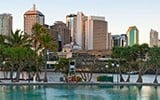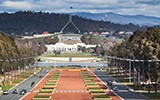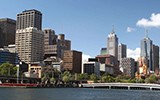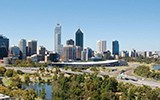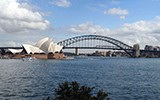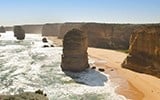Every year, thousands of expatriates arrive in Sydney, with hearts full of hope and dreams and wanting to use their skills to ...
Living in Australia guide for expats
All the information you need to relocate and live in Australia.
Our selection of articles for expatriation in Australia
Expats generally look for the safest neighbourhoods to live in Sydney. Also, finding reliable and inexpensive parking is not easy ...
Australian universities are among the most highly rated in the world, while admission requirements are relatively flexible and ...
Melbourne is a great city with a lot to offer. Looking for a romantic evening with your partner, a family day out, a fun activity ...
Expatriates around the world are looking to Sydney not only to boost their careers but also for a more attractive salary ...
Australians are generally considered to be very laid back. And it's not wrong! Even in the workplace, Australians tend to be ...
Eating is more than a pastime in Australia, and you'll find a wide selection of restaurants, bars and pubs in virtually every ...
Sydney is an expensive city for international students, not only because of the high tuition fees, but also because of the living ...
Time and time again, Melbourne has been named one of the most livable cities in the world. Melbourne is a popular city for ...
You might think that nature in Sydney is all about the coastline, but that's far from the case. The city has much more to ...
Melbourne is a city with a busy calendar, and no matter what your interests are, you're sure to find something you'll ...
Melbourne attracts people from all over the world and it's no wonder expats and international students decide to settle here ...
Moving to Australia If you are planning to move your belongings when moving to Australia, the process requires organization ...
A relaxed and serene lifestyle? We're talking about Australia! Many expatriates are attracted by some of the highest salaries ...
Melbourne's Neighborhoods Melbourne is a great city with a multitude of beautiful neighborhoods to live in. No matter ...
About Australia
Demography and culture
As of 2019, Australia has an estimated population of 25.09 million, with a growth rate of 1.28 per cent, and is the 55th most populated country in the world. As the 6th largest country in the world, the population density is very low as a lot of Australia is uninhabited. The main cities with a population over a million are Sydney, Melbourne, Brisbane, Adelaide, and Perth - with 82 per cent of the population living within 50 kilometres of the country's coastline. This is where most capital cities are, but the coast also enjoys a more delightful climate than the harsh conditions of the country's interior, known as the outback. Canberra, located in the Australian Capital Territory, is Australia's capital but is one of the smallest Australian cities.
The official language of the country is English. However, there are large communities of different languages spoken at home, including Greek, Italian, Chinese, Serbo-Croatian, Arabic, German, and Vietnamese. This is due to the huge waves of immigration over the last century. Diversity is a great asset to the Australian culture, with Australia's population quadrupling since World War One due mostly to immigration. At least 30 per cent of the population in the 2011 census was born in another country, with the most common migration coming from the United Kingdom, New Zealand, China, India, and Vietnam.
Melbourne is the most multilingual and multicultural city in Australia, with around 140 different cultures represented.
Australians are renowned for their friendly and laid-back nature. This is perhaps why Australia is ranked as one of the top five most tolerant countries in the world. The 2011 Human Development Index which takes into consideration, life expectancy, literacy rates, education standards, and child welfare, ranked Australia second in the world. Australians are guaranteed equal worth, dignity and freedom, freedom of speech and association, and freedom of religion in a secular government. It also values the equality of men and women, and peacefulness.
Australia's economy
Australia remains one of the wealthiest nations and has enjoyed more than two decades of growth. The Australian government has a strong focus on supporting business, trade, and public works projects, which is an asset to the country's economy. Australia's Gross Domestic Product (GDP) is about 1.2 trillion Australian dollars and has a low unemployment rate of 5.6 per cent. The Australian economy is supported by its major industries, including finance, healthcare, mining, energy, and tourism. Australia is rich in natural resources and is a major exporter of minerals and energy, as well as agricultural products, namely wool and wheat.
The Australian constitution
Australia is a democratic country, governed by a constitutional monarchy. However, a law passed through the British parliament in the 1930s forbids any British interference in Australian laws. Australia has three levels of law-making or three levels of government; local councils ' over 560 of them, which make local laws for their region; State/Territory Parliaments ' six states and two territory parliaments, who make laws for their state or territory; Federal Parliament, who makes laws for the whole of Australia. Australia also requires compulsory voting for all citizens, being one of the few countries in the world to do so.
Climate in Australia
Due to the huge geographic size of Australia, the climate varies greatly, depending on location. The far north and North-East coasts have a tropical climate, and it is hot almost all year round. The north is also known for its seasonal rainfall, collectively known as the 'wet' and 'dry' seasons, with occasional cyclones occurring. The south and southwest coasts enjoy a Mediterranean climate, with warm summers and colder winter months. Tasmania, due to its southern position, has a much colder climate, and even receives snowfall. In the outback, the area has an arid or desert climate, with very low rainfall, and extreme temperatures that can be very hot in the days, cooler in evenings, and can even reach freezing in winter. Australia is the world's driest and lowest continent. Average temperatures vary between 25 C and 28 C in summer, and between 12 C and 15 C in winter. As Australia is located in the Southern Hemisphere, the seasons are opposite to the American climate - summer runs from December to March, with winter being from June to September.
